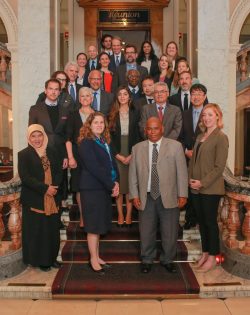- News
- October 24, 2019
 To develop the Global Health Security (GHS) Index, the Nuclear Threat Initiative (NTI), the Johns Hopkins Center for Health Security (JHU) and The Economist Intelligence Unit (EIU) convened an international panel of 21 experts from 13 countries across every region of the globe. As the GHS Index team worked to develop a framework for the index that measures health security across countries of all sizes, in all regions, and at all income levels, panel members brought invaluable expertise, geographic perspectives and experience from service in national governments, intergovernmental agencies, academia, public health, and healthcare. The panelists traveled from South Korea, India, Liberia, South Africa, Peru, the United States, and Finland, among other countries, to participate in two expert panel meetings, held in London in 2017 and 2019.
To develop the Global Health Security (GHS) Index, the Nuclear Threat Initiative (NTI), the Johns Hopkins Center for Health Security (JHU) and The Economist Intelligence Unit (EIU) convened an international panel of 21 experts from 13 countries across every region of the globe. As the GHS Index team worked to develop a framework for the index that measures health security across countries of all sizes, in all regions, and at all income levels, panel members brought invaluable expertise, geographic perspectives and experience from service in national governments, intergovernmental agencies, academia, public health, and healthcare. The panelists traveled from South Korea, India, Liberia, South Africa, Peru, the United States, and Finland, among other countries, to participate in two expert panel meetings, held in London in 2017 and 2019.
During the first meeting, panelists weighed in on what capacities and capabilities should apply under each of the six GHS Index categories to ensure global health security. During the second meeting, they participated in a weighting exercise to determine how GHS Index scores would be compiled. Individual panelists also provided input on specific topics and questions throughout the development of the index.
- David M. Barash, Executive Director, GE Foundation
- David Blazes, Senior Program Officer, Surveillance and Epidemiology, Global Health Program, Bill & Melinda Gates Foundation
- Mukesh Chawla, Adviser, Health, Nutrition and Population, World Bank; Chair, UNAIDS and World Bank Global Economics Reference Group on HIV-AIDS
- Chaeshin Chu, Deputy Scientific Director, Division of Risk Assessment and International Cooperation, Korea Centers for Disease Control and Prevention (KCDC)
- Scott F. Dowell, Deputy Director, Vaccine Development and Surveillance, Global Health Program, Bill & Melinda Gates Foundation
- Wu Fan, Deputy Director General, Shanghai Municipal Health Commission, China
- Dylan George, Vice President, Technical Staff and BNext, In-Q-Tel
- Lawrence O. Gostin, Faculty Director and Founding Chair, O’Neill Institute for National and Global Health Law, Georgetown University Law Center
- Ernesto Gozzer, Associate Professor, Universidad Peruana
Cayetano Heredia; International Consultant - Wilmot James, Visiting Professor, Political Science and Pediatrics, Columbia University
- Julius J. Lutwama, Senior Principal Research Officer, Ministry of Health, Uganda; Head of the Department of Arbovirology, Emerging and Re-Emerging Viral Infectious Diseases, Uganda Virus Research Institute (UVRI)
- Issa Makumbi, Director, Public Health Emergency Operations Centre, Ministry of Health, Uganda
- Pretty Multihartina, Director, Center for Health Determinant Analyst, Ministry of Health, Indonesia
- Lee Myers, Manager, a.i., Emergency Management Centre for Animal Health (EMC-AH), Food and Agriculture Organization (FAO) of the United Nations (on behalf of the United States Department of Agriculture)
- Indira Nath, Former Senior Professor and Head, Department of Biotechnology, All India Institute of Medical Sciences
- Simo Nikkari, Director and Professor, Centres for Military Medicine and Biothreat Preparedness, FDF Logistics Command, Finland
- The Honorable Cllr. Tolbert G. Nyenswah, Director General, National Public Health Institute, Liberia
- Robert Powell, Editorial Director Americas, Thought Leadership, The Economist Intelligence Unit
- Malik Muhammad Safi, Director of Health Programs and Head of Health Planning, System Strengthening and Information Analysis Unit, Ministry of National Health Services, Regulation and Coordination, Pakistan
- Tomoya Saito, Chief Senior Researcher, Department of Health Crisis Management, National Institute of Public Health, Japan
- Oyewale Tomori, Professor of Virology; Former President, Nigerian Academy of Science